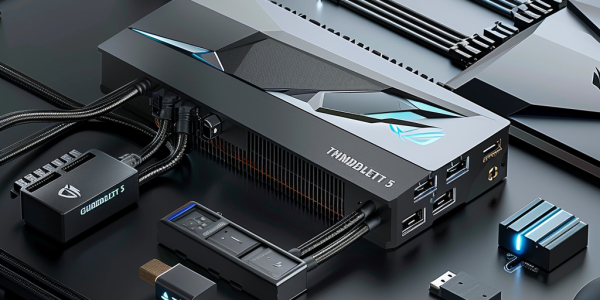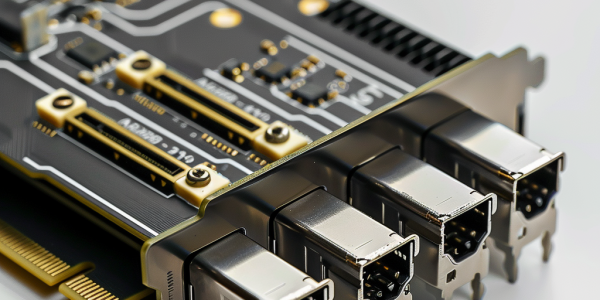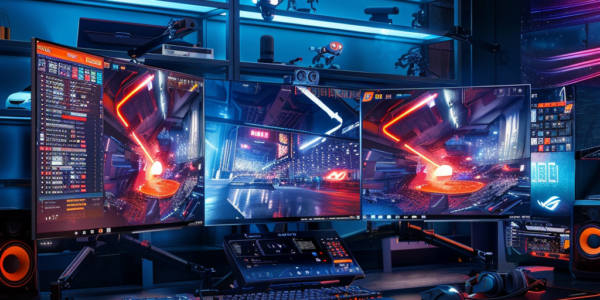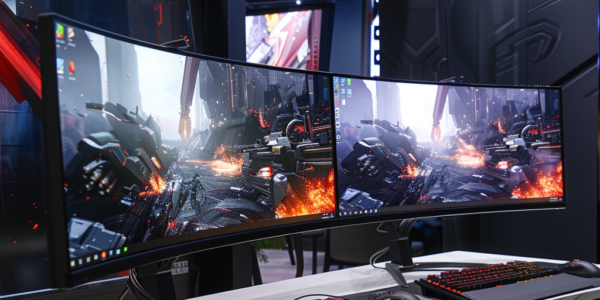Gigabyte Launches First Thunderbolt 5 Expansion Card for Enhanced PC Connectivity
Gigabyte has launched its first Thunderbolt 5 expansion card, enhancing PC connectivity with speeds up to 80 Gbps. Equipped with three Mini-DisplayPort connectors and two USB Type-C ports, this card supports multiple devices and offers robust power delivery. Ideal for gamers and professionals, it promises to revolutionize high-speed connectivity and expand system capabilities.
MSI Announces Pricing for World’s First AI Gaming Monitor, MEG 321URX QD-OLED
MSI has unveiled the pricing for the MEG 321URX QD-OLED monitor, touted as the world’s first AI gaming monitor. With advanced features like a Gen 3 QD-OLED panel, 4K resolution, 240 Hz refresh rate, and 0.03 ms GtG response time, this monitor aims to give gamers an edge in online multiplayer games. Priced at $1,699.99, the MEG 321URX includes AI Sky Sight, Gaming Intelligence, and SpectrumBar technologies to enhance the gaming experience. Stay updated on the latest gaming technology with this cutting-edge monitor from MSI.
Aetina Unveils IA380E-QUFL PCIe Graphics Card at Embedded World 2024
Aetina unveils the IA380E-QUFL, a small form factor PCIe graphics card powered by the Intel Arc A380E GPU, offering workstation-level performance in a compact design ideal for edge computing environments. With 4.096 TFLOPs peak FP32 performance, native support for 4 mini-DisplayPort outputs, and 6GB of GDDR6 memory, this versatile card is suitable for various applications such as commercial gaming, video walls, medical imaging, and visual inference for smart cities. Aetina guarantees a 5-year product supply for the IA380E-QUFL, aligning with Intel’s product plans for long-term stability in industrial settings.
Gigabyte Unveils AORUS FO27Q3 and AORUS FO32U2 Gaming Monitors at CES 2024
Gigabyte unveils two new gaming monitors, the AORUS FO27Q3 and AORUS FO32U2, featuring cutting-edge display technology and gaming-enhancing features. With impressive refresh rates, color quality, and connectivity options, these monitors are tailored to meet the demands of serious gamers. Stay tuned for pricing and release date information. Plus, check out related developments in the gaming monitor market, including new releases from MSI, Acer, Asus, Alienware, and AOC.
HDMI Forum Blocks Open Source Implementation, Impacting Linux Users
The HDMI Forum has reportedly told AMD that it does not allow an open source implementation of the HDMI 2.1 specification, effectively blocking tools such as AMD’s FreeSync from working over HDMI connections at high resolutions and frame rates on Linux systems. This decision has significant implications for Linux users, as they are unable to achieve the same resolutions and speeds as Windows users or those using DisplayPort connections. The rejection of an open source HDMI 2.1 implementation has raised concerns and speculation, with some suggesting potential interference from media firms worried about digital video ripping. This decision has significant implications for the Linux community and highlights the ongoing challenges faced by open source developers in accessing and implementing industry standards.
Dell Unveils New QD-OLED Gaming Displays with Impressive Specifications
Dell unveils two new gaming display models featuring QD-OLED panels, offering impressive specifications and versatile connectivity. With peak brightness, wide color coverage, and adjustable stands, these monitors cater to the needs of demanding gamers. Priced as premium offerings, the launch has garnered attention from gaming enthusiasts and industry professionals, setting a new standard for immersive gaming experiences.






